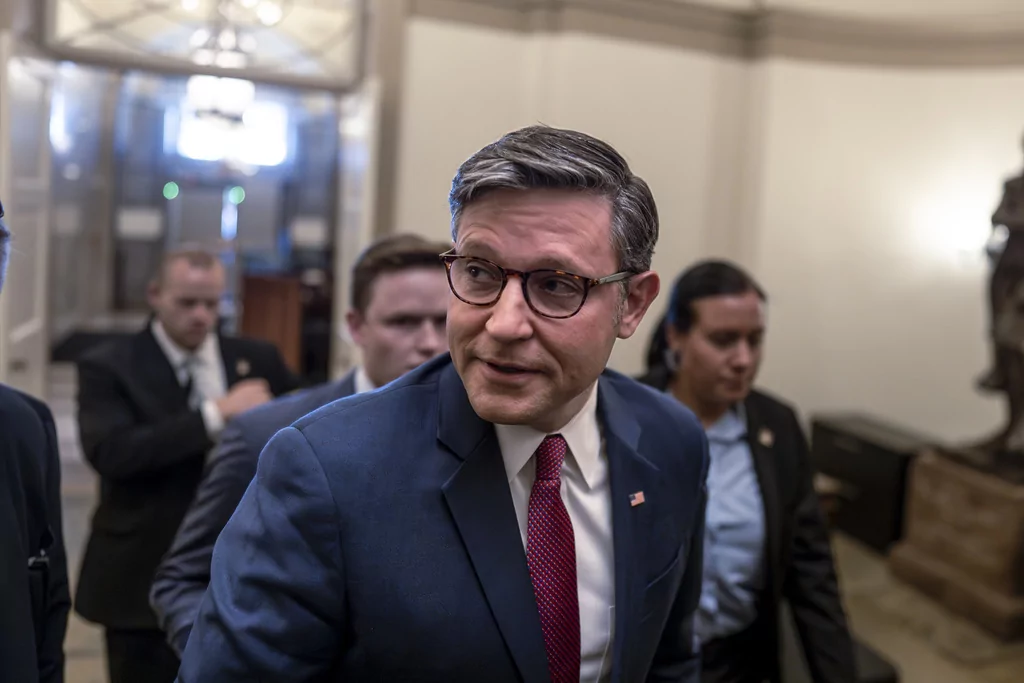

Republicans have been saying for years that they aren’t trying to make it harder to vote. They have been tightening the lid on rules around elections that were loosened during COVID-19, and that meant 2020 not only saw the largest turnout in any presidential election ever but also that there was increased skepticism and doubt about the results.
“Easy to vote. Hard to cheat.” That’s the standard lawmakers cracking down on voting rules have said they are trying to set.
House Speaker Mike Johnson (R-LA) is trying to take state-level efforts to put up higher guardrails around voting a step further. While he is navigating a tense spending fight (more on that later), he is insisting on attaching the Safeguard American Voter Eligibility, or SAVE, Act to the continuing resolution that would keep the government funded and avoid a shutdown a little more than a month before Election Day.
There’s no chance the act, which would require people to provide proof of citizenship when they register to vote, will survive scrutiny in the Democratic-controlled Senate. It might not make it out of the GOP-controlled House. But, as Justice Department Reporter Ashley Oliver examined this morning in the third installment of our Legal Games series, the fight is symbolic of where each party is when it comes to voting laws.
“The SAVE Act encapsulates two issues that have dominated the Republican Party: secure elections and immigration,” Ashley wrote.
Democrats have insisted there is no need to codify requirements to prove you are a citizen when registering to vote. Registration forms have a box to check that signals acknowledgment that you are a citizen and understand that noncitizens aren’t allowed to vote in the United States. There have been some instances of noncitizens voting in recent years, though the results have been negligible.
If the system is relatively secure, and there haven’t been enough errant votes to sway any election, Democrats are asking, “Why put up another barrier?”
The problem with that question, Rep. Darrell Issa (R-CA) told Ashley, is that Democrats are rejecting the “mainstream ideal.”
“They’ve refused to support its mainstream ideal, arguing there is zero problem,” Issa said. “But after only brief review, we know noncitizens have cast votes in our elections. My constituents tell me illegals voting is a concern, because it’s wrong, and we know now it’s not the hoax Democrats have claimed.”
Noncitizen voting isn’t a hoax. Noncitizen voting has provided a negligible effect on elections. And swing state Arizona has such a law in effect.
Supporters of the SAVE Act have pointed to Arizona’s model as proof of concept that such a safeguard is not only reasonable but workable.
“The 1993 National Voter Registration Act, also known as the ‘motor voter’ law, required every state to use a common federal form to register people,” Ashley wrote.
“However, Arizona offers an unusual state registration form in addition to the required federal form, resulting in a two-tiered voter registration system. The state form requires documented proof of citizenship from a registrant, while the federal form is the standard form offered across the country that has only the checkbox. If registered under the federal form without documented proof of citizenship, that voter can only participate in federal elections and not state or local elections,” she wrote.
Arizona’s law was at the center of a recent Supreme Court fight. Republicans didn’t claim total victory in the fight, though they did prevail on the primary question of whether they were allowed to require the state form in addition to the federal one.
Chad Ennis, a longtime attorney and Honest Elections Project vice president, told Ashley laws such as the SAVE Act and Arizona’s registration rules aren’t about keeping legitimate voters off the rolls. They’re in place to bolster confidence in elections generally.
Click here to read more about a central concern about election security heading into Election Day.
Spending bill week is back
Republicans have been in power in the House for almost two years, and their record on getting spending bills sorted on time isn’t spotless. A cadre of fiscal hawks promised they would be better about expediting the appropriations and budget process than their Democratic counterparts were.
But we are days away from another spending bill deadline, and Johnson is struggling to whip his caucus into line.
After pulling a continuing resolution, with the SAVE Act attached, last week when it was clear he didn’t have the votes, Johnson is planning to put the same plan back on the floor today, and he doesn’t have a Plan B if, and likely when, it goes up in flames, Congressional Reporter Cami Mondeaux wrote for us this morning.
“At least a dozen lawmakers initially came out in opposition to Johnson’s proposal, which seeks to extend current government spending levels until the end of March and attach a proof-of-citizenship voting bill as a GOP policy rider,” Cami wrote. “That opposition makes the legislation likely dead on arrival, as Johnson can only afford to lose four Republican votes if there is full attendance and all Democrats vote against it.”
Johnson and the rest of House leadership spent the weekend trying to convince skeptics that a six-month continuing resolution is the best deal they are going to get. Kicking the spending can down the road into next year could give them an opportunity to negotiate a budget with Donald Trump — assuming he beats Vice President Kamala Harris in November and Republicans hold on to their slim majority in the House.
Delaying negotiations could also give them a more favorable Senate, as Republicans appear poised to retake the majority in the upper chamber.
Johnson’s critics, however, aren’t interested in talking about what might happen six months from now. The loudest, such as Rep. Marjorie Taylor Greene (R-GA), are more concerned about what happened months ago.
“I refuse to lie to anyone that this plan will work and it’s already DOA this week,” Greene wrote on X. “Speaker Johnson needs to go to the Democrats, who he has worked with the entire time, to get the votes he needs to do what he is already planning to do.”
Johnson, like then-Speaker Kevin McCarthy before him, has cut deals with Democrats to push spending bills over the line and prevent shutdowns that would make electoral life much harder for Republicans, who control the House and the country’s purse strings.
Greene doesn’t believe Johnson will stick to his guns on including the SAVE Act. If today’s CR does make it out of the House, it is expected the Senate will reject it and instead send back a “clean” resolution — a spending agreement that prevents a shutdown but doesn’t have anything else attached.
Such a bill would likely survive a House vote, with Democratic support, and avert a government shutdown. But it might also shut down Johnson’s hopes of keeping his caucus’s top job next year.
Click here to read more about the looming shutdown fight.
New from us
How the Fed interest rate decision could have ‘significant’ impact on Harris
Nebraska independent vying for Fischer’s Senate seat privately praises Bernie Sanders
Supreme Court asked to weigh religious liberty cases, including LGBT content opt-outs in schools
Democratic struggle for House control runs through New York
Race to boost Secret Service funding hits GOP snag after Trump assassination attempt
In case you missed it
The House Freedom Caucus picked its new leader
Harris sat down for a solo interview
Mitch McConnell really doesn’t want a shutdown
For your radar
President Joe Biden will host a reception in honor of Hispanic Heritage Month at the White House at 5 p.m.
Harris will speak at the Congressional Hispanic Caucus Institute’s 47th Annual Leadership Conference at 12:15 p.m. before participating in a virtual campaign event at 3:45 p.m.
White House press secretary Karine Jean-Pierre will brief reporters at 1 p.m.
Trump will hold a rally in Uniondale, New York, at the Nassau Veteran Memorial Coliseum at 7 p.m.
Sen. J.D. Vance (R-OH) will speak at a campaign event in Raleigh, North Carolina, at 3 p.m.






